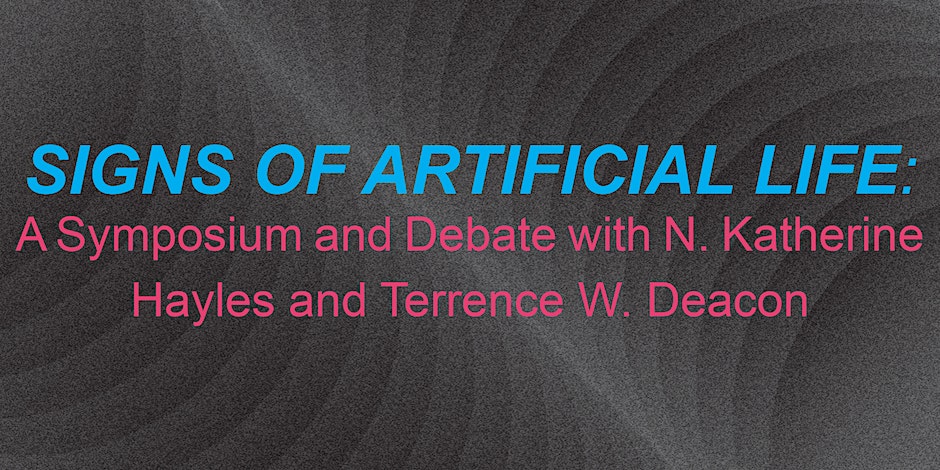The video recordings for Signs of Artificial Life: A Symposium and Debate with N. Katherine Hayles and Terrence W. Deacon are now available. The event brought together two luminaries in the study of signs and the cognitive features of language-making, putting two major frameworks for the study of artificial intelligence (AI) into direct conversation. Featuring separate talks from each speaker’s recent research as well as a moderated conversation about semiotics, cognition, and AI. This event, held March 30-31, 2023, was sponsored by the Digital Theory Lab and hosted by the NYU Center for the Humanities.
Below are links to the video recordings, along with full descriptions of each talk.
- N. Katherine Hayles, Inside the Mind of an AI: How to Read Machine-Generated Literature
- Terrence W. Deacon, In the Shadow of Descartes: The Difference Between Computing and Thinking is Both Physical and Semiotic
- A conversation with Terrence W. Deacon & N. Katherine Hayles moderated by Leif Weatherby

Inside the Mind of an AI: How to Read Machine-Generated Literature with N. Katherine Hayles
Thursday, March 30th, 3:00-4:30pm
With the development of large language models such as GPT-3 that can produce semantically coherent and syntactically correct text, deep questions arise about how we should understand these machine-generated texts. Are they merely stochastic recyclings from the gigabytes of human texts on which the programs have been trained, without intrinsic meanings of their own? Or are they evidence for AI sentience, as Blake Lemoine claimed for Google’s LaMDA? In addition to these techno-philosophical questions, other issues arise from a literary-theoretical perspective. What assumptions should underlie our engagements with these texts? Should we take into account their origin in machine reading and writing, or following the postmodern claims of theorists such as Foucault and Barthes, should we treat them as we would any other (human-produced) text? This talk explores these issues, arguing that we should indeed attend to their machinic origins. It offers four exemplary strategies of interpretation appropriate to machine texts, with samples from GPT-3 transcripts. It also muses on the future of writing, especially in composition classes, in an era when it is increasingly difficult to distinguish between human and machine-generated texts.
In the shadow of Descartes: The difference between computing and thinking is both physical and semiotic with Terrence W. Deacon
Thursday, March 30th, 5:00-6:30pm
In this talk I argue that two oversimplified assumptions stand in the way of understanding the relationship between mental processes and computations. Both assumptions contribute to a promiscuous use of the term of ‘information’ that reduces three hierarchically distinct meanings of ‘information’ to signal properties and obscures the semiotic complexity of symbolic reference.The first assumption involves a misunderstanding of the relationship between physical and informational entropy; free energy and constraint. This can be re-framed by demonstrating how self-organizing processes can be coupled so that they re-present their organization despite radical substrate change. The second assumption involves a reduction of the ‘symbol’ concept to conventional tokens linked by a mapping relationship; a caricature of linguistic reference. This can be re-framed by demonstrating how referential displacement is dependent on and grows out of an iconic and indexical pragmatic context. Reconstructing these hierarchically collapsed assumptions, re-grounds the referential and normative aspects of information in the physical world and shows why “cogito ergo sum” should be “I feel therefore I’m real.”
A conversation with Terrence W. Deacon & N. Katherine Hayles moderated by Leif Weatherby Friday, March 31st, 11:00-12:30pm
Every day seems to bring a new headline about a breakthrough in artificial intelligence, raising questions about human language and its relationship to conceptual thinking as a core human capacity. In this concluding session N. Katherine Hayles and Terrence W. Deacon engage in a debate moderated by Leif Weatherby.